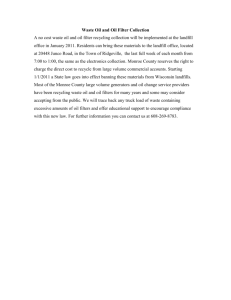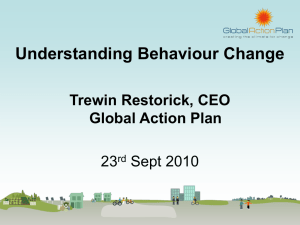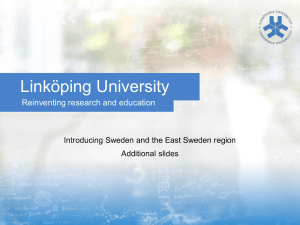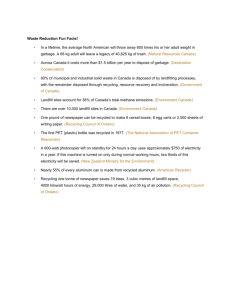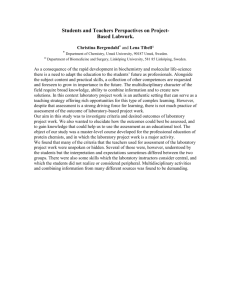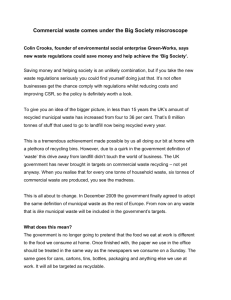In other words, "How to attract investors and create business?”
advertisement
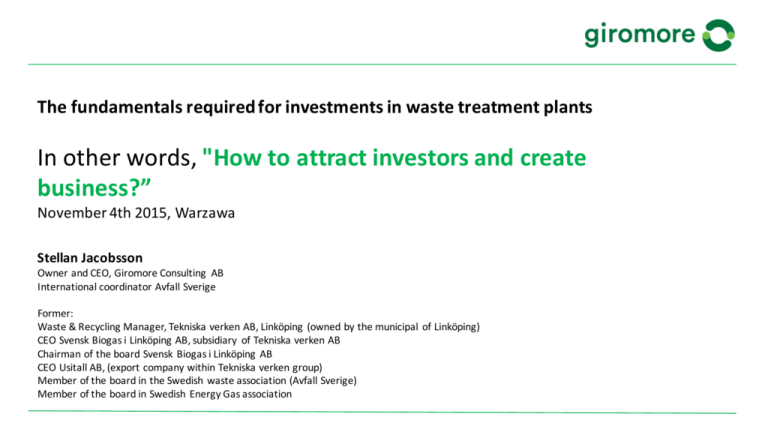
The fundamentals required for investments in waste treatment plants In other words, "How to attract investors and create business?” November 4th 2015, Warzawa Stellan Jacobsson Owner and CEO, Giromore Consulting AB International coordinator Avfall Sverige Former: Waste & Recycling Manager, Tekniska verken AB, Linköping (owned by the municipal of Linköping) CEO Svensk Biogas i Linköping AB, subsidiary of Tekniska verken AB Chairman of the board Svensk Biogas i Linköping AB CEO Usitall AB, (export company within Tekniska verken group) Member of the board in the Swedish waste association (Avfall Sverige) Member of the board in Swedish Energy Gas association Sweden 9,8 million inhabitants 450 000 km2 290 municipalities Swedens results for domestic waste 47,3% 35,6% 16,4% 0,7% You need a strong framework with plans, regulations, permissions and supervision National level – committed politicians § § § § Legislation National environmental targets National waste plan Guidelines Local/Municipal level Municipal authorithies: § Monopoly for household waste – (or other ways to control and secure the waste (and revenues) stream to plants with appropriate treatment methods). § Local waste plans and local regulations ”EU” Waste Management is an integrated part of a holistic system Products Farms Households Material recycling Sewage water cleaning Biosolids Waste Anaerobic digestion Business opportunities exists ”everywhere”!!! Vehicle fuel Landfill Incineration Biogas Other fuels Cooling/ heating production Electricity production Why are Sweden successful? -­‐ Organization and cooperation between the public and the private • European directives – same as Poland • Strong and ambitious national legislation • Domestic waste – municipals monopoly. Collection from estate properties. The owners of these, are obliged to pay for the service to the municipality. The service shall be performed according to a ”self-­‐cost” principle. • 75% of the municipalities use private entrepreneurs for collection and the waste sector engage many other entrepreneurs. • Deregulated market for commercial waste where the waste owner has a clear responsibility to follow the legislation. • Producer responsibility for packages, papers, tyres, etc. Clear national Targets, long-­‐term regulations and economical steering instruments – stable regulations means stable business 1600000 50 % 1400000 Landfill tax introduced 1200000 1000000 800000 Ban on landfill of organic waste Municipal 600000 waste 400000 planning compulsory 200000 2010 2005 2000 1995 0 1990 Household waste to landfill per year (tonnes) Producers’ responsibility introduced Ban on landfill of combustible waste Consider waste as a resource -­‐ secure revenue streams, (the economy…) Materials Products Virgin materials and energy saved Food waste Biogas -­‐ vehicle fuel Biofertilizer Petrol saved and industrial fertilizer saved Combustible waste Hazardous waste District Electricity Heating/ cooling Direct environmental benefit Fossil and other fuels saved Environmental protection costs saved Good for the economy – good for the environment 2014: • 13,7 TWh district energy -­‐> 20 % of the total district energy in Sweden -­‐ the heating need of 950 000 homes • 1,8 TWh electricity – the need of 260 000 homes Material recycling Biological recycling Energy recovery Landfill 2014: • 511 GWh vehicle-­‐fuel produced from foodwaste corresponding to the need of about 30 000 cars • 940 000 tonnes biofertilizer produced replacing industrial fertilizer Energy recovery of waste – national level Sweden 32 plants: Recovering yearly • totally 5 279 000 tonnes • of which 2 236 000 tonnes municipal waste Gate fee approx 35-­‐65€ /tonnes (average 48€)/y Essential for the economy – today there is a market for brokers. Advanced systems lead to more business opportunities! The most energy efficient plants in the world – securing the project economy MWh 3,0 /ton Electricity Heat Recovered energy per tonne household waste incinerated 2,5 2,0 Co-­‐operation within municipalites are necessary to achieve this (Waste-­‐, Energy-­‐, Water-­‐, Urban planning-­‐, etc) The local community must have its own high procurement skills 1,5 1,0 0,5 0,0 If industrial waste was included in the diagram the Swedish result would be almost 3 MWh/tonnes A robust waste system comprise biological treatment and involves, for us, new markets… It is the most increasing treatment method in Sweden today §Today about 25 plants – heavy investments §Energy recovery and production of biogas used as vehicle-­‐fuel -­‐ demand of better understanding of the transportation sector §Recycling of nutrients need enter-­‐ prises with agriculture competences The Biogas business for vehicle fuels is developed in Linköping – today +300 people in the region are employed in the biogas business. Most of them in private companies. From landfills to recycling facilities – an ”eldorado” for the entrepreneurs Just few examples of possibilities Crushing – IQR Swedish supplier of special designed chrushers Sorting – local entrepreneurs Baling – national entrepreneurs. Baling equipment from Sweden Transportation – local entrepreuners Civil works – local entrepreuners Trading – local brokers Adminstration – local entrepreuners. Special designed Swedish solutions, both hardware & software Gas collection system & power generation – world leading technologies from Sweden (Illustrator: Per Josefsson) Waste treatment methods, Sweden -­‐ the long term trend (Will it also happen on the Polish market?) Important success factors in Sweden – national level 0,7% • Strong legislation • Clear national environmental targets showing the direction and long-­‐term regulations and economical steering instruments 35,6% 47,3% • Collaboration between public and private sectors • Holistic system view-­‐ and an integrated part of the sustainable society adopted to the local conditions 16,4% Material recycling Biological recycling Energy recovery Landfill • Integration in municipalites with; Waste-­‐, Energy-­‐ and Water sectors, Urban planning-­‐, etc) Other success factors in our society – local level • Commited politicians • Adequate personell resources – with high own competence in the municipalities for system design and procurement • Strong ”project” economy • End-­‐user friendly systems • Massive and long term informa-­‐ tion/communication/education "How to attract investors and how to create attractive business opportunities?” Conclusions • Introduce steering documents which supports the desirable environmental targets • Secure the revenue streams – efficiency and entrepreneurship • Build up the municipalities own competences in system design and procurement • Chose proven solutions • Optimize efficiency – learn from successful markets. Swedish municipalities and private companies can offer advisor services to the Polish market players. • Create partnership and cooperations between the public and private parts in the waste sector. • Strong focus on information, education and communication of the population, NGO:s as well as the decision makers. Minimize the political risks. Openness, since it´s a long term responsibility to be an actor in the waste sector! The trend towards a more developed waste & recycling sector means new business opportunities! Thank you for your attention! For further information please contact Stellan Jacobsson, Senior Consultant E-­‐mail: stellan@giromore.se +46706078095

